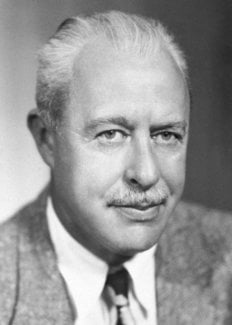Walter H. Brattain
Biographical

Walter H. Brattain was born in Amoy, China, on February 10, 1902, the son of Ross R. Brattain and Ottilie Houser. He spent his childhood and youth in the State of Washington and received a B.S. degree from Whitman College in 1924. He was awarded the M.A. degree by the University of Oregon in 1926 and the Ph.D. degree by the University of Minnesota in 1929.
Dr. Brattain has been a member of the Bell Laboratories technical staff since 1929. The chief field of his research has been the surface properties of solids. His early work was concerned with thermionic emission and adsorbed layers on tungsten. He continued on into the field of rectification and photo-effects at semiconductor surfaces, beginning with a study of rectification at the surface of cuprous oxide. This work was followed by similar studies of silicon. Since World War II he has continued in the same line of research with both silicon and germanium.
Dr. Brattain’s chief contributions to solid state physics have been the discovery of the photo-effect at the free surface of a semiconductor; the invention of the point-contact transistor jointly with Dr. John Bardeen, and work leading to a better understanding of the surface properties of semiconductors, undertaken first with Dr. Bardeen, later with Dr. C.G.B. Garrett, and currently with Dr. P.J. Boddy.
Dr. Brattain received the honorary Doctor of Science degree from Portland University in 1952, from Whitman College and Union College in 1955, and from the University of Minnesota in 1957. In 1952 he was awarded the Stuart Ballantine Medal of the Franklin Institute, and in 1955 the John Scott Medal. The degree at Union College and the two medals were received jointly with Dr. John Bardeen, in recognition of their work on the transistor.
Dr. Brattain is a member of the National Academy of Sciences and of the Franklin Institute; a Fellow of the American Physical Society, the American Academy of Arts and Sciences, and the American Association for the Advancement of Science. He is also a member of the commission on semiconductors of the International Union of Pure and Applied Physics, and of the Naval Research Advisory Committee.
In 1935 he married the late Dr. Keren (Gilmore) Brattain; they had one son, William Gilmore Brattain. In 1958 he married Mrs. Emma Jane (Kirsch) Miller. Dr. Brattain lives in Summit, New Jersey, near the Murray Hill (N.J.) laboratory of Bell Telephone Laboratories.
This autobiography/biography was written at the time of the award and first published in the book series Les Prix Nobel. It was later edited and republished in Nobel Lectures. To cite this document, always state the source as shown above.
Walter H. Brattain died on October 13, 1987.
Nobel Prizes and laureates
Six prizes were awarded for achievements that have conferred the greatest benefit to humankind. The 12 laureates' work and discoveries range from proteins' structures and machine learning to fighting for a world free of nuclear weapons.
See them all presented here.
